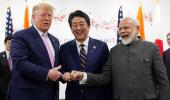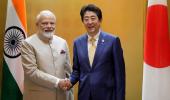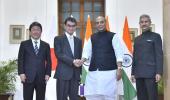China, the Ukraine crisis and Quad will dominate the discussions, observes Dr Rajaram Panda.

Japan's Prime Minister Fumio Kishida travels to India on March 19 for a two-day visit for a crucial bilateral summit meeting with his Indian counterpart Narendra Damodardas Modi.
Kishida is familiar with India having travelled earlier when he was Japan's foreign minister.
Earlier this month, The Japan Times reported that Kishida was planning to visit India and Cambodia in late March and the dates were released only on March 15.
This would be the first bilateral summit meeting since Modi's meeting with then Japanese prime minister Abe Shinzo on December 15-17, 2019. The 2020 proposed Modi-Abe summit in Guwahati was cancelled after protests in Assam over the Citizenship (Amendment) Act.
Despite global turmoil after the Russian invasion of Ukraine, Japan sought an early summit date.
It is the first trip to a South Asian country by a Japanese prime minister since Abe's visit in 2019.
Why was this so? And, what outcome can be expected from the summit?
Besides Kishida's agenda to strengthen bilateral ties, he is keen to discuss the current global political scenario including the Russia-Ukraine crisis and China's belligerence in the South China Sea as well as in the Indo-Pacific region.
Besides discussing the customary subject of pursuing and reaffirming a 'free and open' Indo-Pacific region as members of the four member grouping Quad (India, the US, Australia and Japan), Kishida seems to have prioritied a discussion on the Russia-Ukraine crisis since responses from both sides are different.
While Japan joined the Western bloc in imposing sanctions against Russia and voted at the United Nations Security Council and General Assembly condemning the Russian invasion, India not only abstained from the US-led resolution but announced that it adheres to its policy of neutrality in its foreign policy and urged for dialogue.
Kishida probably wants to understand India's stance and hence wanted an early summit with Modi.
Of course, promoting security cooperation among the Quad members amid China's rising assertiveness in the Indo-Pacific region will also figure prominently.
After India, Kishida flies to Cambodia for a two-day visit from March 20-21, again with a request for a meeting with Prime Minister Hun Sen, to solicit support for Ukraine's sovereignty and territorial integrity.
In 2022, Cambodia holds the rotating chairmanship of the 10-member ASEAN grouping. That makes Kishida's choice to visit Cambodia also significant.
Among other bilateral issues, Kishida and Modi are likely to discuss the high-speed railway project in the Mumbai-Ahmedabad corridor by using Japan's shinkansen bullet-train technology that is under way.
Kishida's trip is expected to give a much-needed push to the project which has been delayed due to land acquisition issues.
The big-ticket project was inaugurated in 2017 by Abe when he had visited India.
It may be recalled that potential investors are wary of selecting projects because of the land acquisition issue.
Korea's POSCO's $13 billion project to build a steel plant in Odisha had to be cancelled over land acquisition issue. This example unnerves Japanese investors.
Besides, labour reforms remain a continuous demand by the Japanese.
Kishida and Modi are likely to discuss such issues so that the potentials of mutual benefits are unleashed.
2022 also marks the 70th anniversary of the establishment of diplomatic relations between the two countries and therefore the visit underscores the significance of this important milestone in the bilateral relations.
Other topics likely to dominate discussion could include a belligerent China threatening anyone who provides military support to Taiwan, China participating in joint air exercises with the Russian air force in the Sea of Japan and China sending warships into the territorial waters of Philippines in the Sulu Sea.
Japan has been incrementally hiking its defence allocation to strengthen its conventional deterrence in the wake of Chinese belligerence in the Indo-Pacific with Kishida expressing a wish to breach the self-imposed embargo of not exceeding the country's defence expenditure of 1 per cent of GDP.
He has shunned any intention for Japan to acquire nuclear weapons or shedding its pacifist doctrine as he represents Hiroshima, the city bombed in August 1945 by the US with nuclear weapons.
He therefore flatly rejected Abe's proposal for 'nuclear-sharing' that was floated in the wake of the Ukraine crisis.
Instead, Kishida's priorities have been to increase defence cooperation with the Philippines and Australia.
The prospects for further enhancing defence cooperation between India and Japan can be seen from this perspective.
Other issue of bilateral relevance could be discussion on building resilient supply chains between partner countries.
This would help them to protect from the vagaries of global politics and dependency on any adversarial country.

Japan will host the in-person Quad meeting after the Australian general election in May.
China sees the Quad grouping as an Asian NATO against Beijing and a Cold War instrument. Of the four members of the Quad, India has dismissed the Chinese allegation with External Affairs Minister S Jaishankar describing the Chinese alluision as a 'lazy analogy' at the Munich Security Conference.
Other issues on the agenda will include Chinese military activity in eastern Ladakh and around the Japanese Senkaku islands, the situation in the Af-Pak region with the Taliban in control of Kabul and the so-called Islamic State raising its head against the Shia Muslim community in Pakistan.
Pakistan Prime Minister Imran Khan's visit to Russia on the very day Russia invaded Ukraine could figure at the discussions.
Since Japan has territorial disputes over the Kurile islands chain with Russia and has a treaty alliance with the US, it was expected that Japan would join the NATO in imposing economic punishment on Russia.
Besides many punitive measures, Japan has revoked Russia's most-favoured nation trade status as part of the sanctions against Russia.
The revocation of the MFN status means Japan would raise tariffs for certain seafood products such as urchins and crabs imported from Russia by passing legislation in the Diet, the Japanese parliament.
According to government data, in 2021, Russia accounted for 81% of sea urchins and 47.6% of crab imported by Japan.
Japan has already slapped sanctions on Russia-bound exports of chips and high-tech equipment, as well on dozens of Russian and Belarusian officials, business executives and banks by freezing their assets.
Though Kishida is likely to explain Japan's actions, Modi is unlikely either to endorse or disapprove such measures given the importance India attaches to its relationship with its time-tested friend Russia.
It would be interesting to watch what outcome transpires from the summit.
Dr Rajaram Panda is Senior Fellow at the Nehru Memorial Museum and Library, New Delhi, and former ICCR Chair Professor at Reitaku University, Japan.
Feature Presentation: Aslam Hunani/Rediff.com










